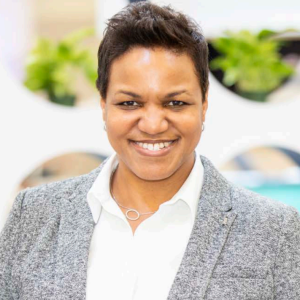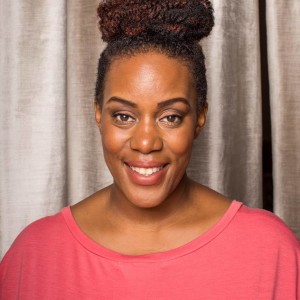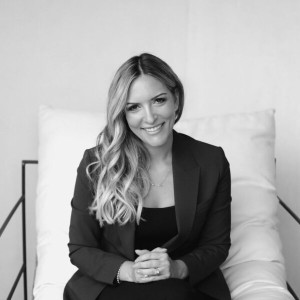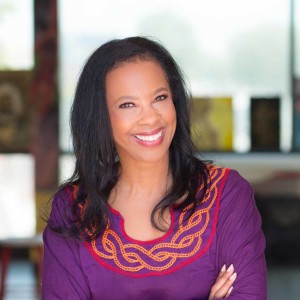The Fix
The Fix is a podcast that shares stories of women and men who are taking action and innovating to advance equality in the workplace and beyond.
The Fix is a podcast that shares stories of women and men who are taking action and innovating to advance equality in the workplace and beyond.
Episodes

Thursday Mar 31, 2022
Why AI treats men and women differently and what to do about it - Alexandra Ebert
Thursday Mar 31, 2022
Thursday Mar 31, 2022
Is AI inherently sexist? Or are we building AI with the biases we are still struggling to root out of our human interactions? And is a lack of diversity in the innovation process translating into the technology? AI is built and maintained by data, and if the data collected only represents the view of one type of individual or overly weights the importance of this information then the decisions AI makes will reinforce this inequality.
In a 2019 article for Sandford Social Innovation Review, entitled 'When Good Algorithms Go Sexist: Why and How to Advance AI Gender Equity', the co-author Genevieve Smith shared how she and her husband applied for the same credit card. Despite having a slightly better credit score and the same income, expenses and debt as her husband, the credit card company set her credit limit at almost half the amount. Customer service employees were unable to explain why the algorithm deemed the wife significantly less creditworthy.
What is most likely to have happened in this case is that AI was to blame as Genevieve shares in her article many institutions make decisions based on artificial intelligence (AI) systems using machine learning (ML), whereby a series of algorithms takes and learns from massive amounts of data to find patterns and make predictions. Yet gender bias in these systems is pervasive and has profound impacts on women’s short and long-term psychological, economic and health security.
On today’s episode we welcome Alexandra Ebert who will share what AI is and how it will impact our jobs but also why you don’t need to be scared of it. Most importantly, Alexandra tells us why we need to manage AI carefully to ensure equitable outcomes and so as not to exacerbate or perpetuate existing gender inequities.
Alexandra's Story
LinkedIn - Alexandra Ebert

Friday Mar 25, 2022
The Pro’s and Con’s of Diversity Targets: Michelle King and Kelly Thomson
Friday Mar 25, 2022
Friday Mar 25, 2022
Diversity is simply good for business. Companies with greater gender diversity in their leadership outperform their less diverse competitors, having higher returns on capital and credited with better employee engagement and retention. These companies have loyal customers, are more relevant to a broader customer base, are more innovative and are better at problem-solving. The same goes for companies that are more ethnically and racially diverse.
Almost no companies are reflective of the diverse makeup of their country despite a spend of $7 billion a year on DEI efforts. Part of the problem is that the fixation on diversity numbers dominates the dialogue around diversity and inclusion. While the numbers are incredibly important they provide a needed snapshot of how an organization’s employee base is made up and can measure things like attraction, retention and promotion.
A focus on diversity numbers alone can create dangerous tunnel vision. By only targeting diversity numbers, businesses can end up failing to deal with the underlying causes of how an organization’s diversity makeup came to be and what the culture of the organization is like.
In order to ensure you have the whole picture, we are going to discuss the pro’s and con’s of having diversity targets. Specifically Kelly is going to share the argument for having diversity targets and Michelle will share why she doesn’t believe that they work and then we will look at how you can try and use them in the right way if you have to have them within your organization.

Thursday Mar 10, 2022
Thursday Mar 10, 2022
The Great Resignation, has seen employees leaving their jobs at unprecedented rates. According to the US Labor Bureau in November 2021 alone, 4.5 million employees quit
Reports by the online media publication The Plug states that workers across the U.S. are finding more reasons to leave their jobs than having reasons to stay, citing burnout, being overworked amid shortages in some industries and pay that hasn’t kept track with inflation. But for Black workers, unaddressed racial issues in the workplace are among the long list of causes, directly fueling the Great Resignation.
Black employees simply don’t feel like they belong and consequently they are turning to entrepreneurship. The number of African American business owners in operation surged to almost 1.5 million in August 2021, up 38% from February 2020.
LinkedIn surveyed over 1,000 Black entrepreneurs to uncover why professionals are starting their own businesses, the factors prompting professionals to leave the corporate workforce and the challenges Black professionals often face when launching a business.
Some of the highlights of their research findings include:
Over 1 in 3 (37%) Black Entrepreneurs with full time jobs have not told their company that they have their own business.
35% of Black Entrepreneurs with full time jobs feel that they’ve been overlooked for career advancement opportunities because they have an additional business.
55% of Black Entrepreneurs left the workforce to pursue entrepreneurship to have more flexibility & control over their schedule.
37% of Black entrepreneurs feel like they have to have someone White on their leadership team/ executive board in order to get funding.
43% of Black entrepreneurs believe having access to funding/capital is key to growing your business, yet only 1 in 4 Black business owners have received funding.
On today’s episode we discuss these findings and more with Rosanna Durruthy, Chief Diversity Officer for LinkedIn. Rosanna shares with us why Black employees are leaving their workplaces to start their own businesses.
https://www.linkedin.com/in/rmdurruthy/
https://twitter.com/talentalchemist
https://dileaders.com/blog/speakers/rosanna-durruthy/

Wednesday Mar 02, 2022
How To Check Your Privilege - with Myisha T. Hill
Wednesday Mar 02, 2022
Wednesday Mar 02, 2022
Being unaware of people’s experiences of inequality like racism or sexism, often inadvertently and unwillingly leads to behaviors that are racist and sexist. We are simply blind to inequality. Being able to learn about inequality without ever having to experience it, is really the ultimate privilege. But just like inequality, when we deny our privilege we are blinded by it. Privilege makes it easy to deny other people’s experiences of inequality and keeps us from seeing the workplace in the way others see it. Denial is what keeps inequality alive in workplaces today. When leaders and employees see how being a part of the dominant group gives them access to power and privilege, they will also become aware of the unique position they are in to dismantle the very inequality they benefit from.
In 2018, anti-racism guide and mental health activist Myisha T. Hill launched the Check Your Privilege movement on Instagram. This is a global movement that supports individuals on their journey to becoming actively anti-racist. In just over three short years, it amassed 750,000 followers and became a sought-after hub for interracial activism during 2020’s ongoing wave of civil unrest.
In her upcoming book, Heal Your Way Forward: The Co-Conspirator's Guide to an Antiracist Future, Myisha shares her perspective and asks this critical question of antiracism work: what do we want the world to look like in 7 generations?
On today’s episode, Myisha shares how we can all take action to check our privilege and tackle systemic racism and prejudices.
Instagram: @myishathill
Website: checkyourprivilege

Wednesday Feb 23, 2022
Wednesday Feb 23, 2022
Today on the show my dear friend Eve Rodsky is joining us! Eve has been featured on the show before, with her New York Times best selling book, Fair Play and now Eve is here again with her new book, 'Unicorn Space', which is all about making time for your creative pursuits.
As a researcher, I was intrigued with this idea that men and women have different opportunities to pursue creative interests, which makes sense. Women disproportionally undertake domestic chores and child care requirements, therefore leaving less time to pursue interests outside of work and home life. For example a study by LifeSearch found that among working women, half (50%) still say they do the majority of household chores, in comparison to men where just one in four (25%) of all working men, spend an average of 7.6 hours on housework per week – almost equivalent to a typical working day – on top of their paid job.
This isn't just that women have less time to be creative and innovative, workplaces in particular de-value women’s creativity. A 2015 academic study published in the journal Psychological Science, finds that creativity itself is gendered. The paper states that organisations increasingly reward those who are seen as true “innovators.” Surveys of top business executives have identified “creative thinking” as the ability most valued in employees and one of the most important skills for the future. However, stereotypical expectations of men and women’s creativity shape how creativity is judged and acknowledged. This paper finds that creativity itself is more strongly associated with stereotypically masculine characteristics and that a man’s work is more likely to be deemed creative. The research also finds that men’s ideas are more often deemed “ingenious” than women’s even when it’s on the same topic. In particular, supervisors assess their female employees as less creative, even when they are exhibiting more of the stereotypically masculine behaviours associated with creativity.
Creativity is gendered. We value men’s creative time, ideas and outputs more than a woman's. Therefore it is no surprise that we make more time for men to be creative because we believe it's more valuable. This is inequality, the belief that men and masculinity are somehow more valuable than women and femininity. And this plays out in all aspects of life, even how we spend our creative time as Eve explains in today's episode.
Website: everodsky.com
Book: Unicorn Space
Instagram: @everodsky

Wednesday Feb 09, 2022
Wednesday Feb 09, 2022
This podcast is dedicated to the topic of hiring diverse talent whilst also looking at what businesses can do to really try and value difference.
Research states that 46% of people’s experiences of inclusion at work are down to their manager’s behavior. So, 46% of your experiences of whether you feel included or not are attributed to your manager’s behavior. So when I hear “not my workplace, I’ve done everything I can. My workplace is a meritocracy. These hostile work environments might be true for some people. It’s not true for my workplace”. I need you to take a breath and accept the fact that because your workplace works for you, you are probably not aware of the ways in which it doesn’t work for other people.
We need to believe people when they tell of their lived experience in your workplace and actually their lived experience of you and understand that actually women might not feel safe to speak up.
Listen in to find out more about how you can hire smart and also listen better to those already hired.

Wednesday Jan 26, 2022
You are closer to being homeless than you think – Regina Jackson
Wednesday Jan 26, 2022
Wednesday Jan 26, 2022
As adults, if we have never experienced homelessness, it can be really tempting to turn away and not engage with the humanity of the situation. Sometimes it’s just too upsetting and we feel guilty or even embarrassed about our own comparative security. We need reminding of the importance of engaging with homelessness empathetically and that it is not as far away as we might like to think.
Often it isn’t just one thing, most people become homeless because a lot of challenges in their life play out at the same time creating an impossible situation. But most people don’t want to hear all the reasons they might become homeless because we don’t want to believe it could be true for us. Out of sight out of mind.
This is why states like Texas in recent months have a new law that criminalizes public camping and bans cities from adopting policies that prohibit or discourage the enforcement of any public camping ban. People who don’t comply with the law can be ticketed, arrested, and fined up to $500. Arresting, fining and punishing people for being homeless does nothing to address homelessness.
On today’s podcast we are joined by community activist Regina Jackson, to share insights from her work as President & CEO of the East Oakland Youth Development Center. For the past 27 years, Regina has provided services and support for homeless youth in the city of Oakland through housing, job training and life skill development opportunities. On this episode she will share why homelessness is an issue for all of us.

Wednesday Jan 19, 2022
Wednesday Jan 19, 2022
I often get asked by people, surely gender equality will just be achieved in time? Aren’t we becoming more progressive? Won’t younger generations ensure we have greater equality because they hold more liberal views.
The answer to all these questions is No.
The belief that we will just achieve equality through the passing of time is one of the reasons we will never achieve equality no matter how much time we have.
Equality is a practice it is something that we do. Taking action every day to value difference is something we all need to do to build a more equitable working world.
The starting point for tackling this is being honest about where we are at and the beliefs we hold that inform how we think and the lack of action each of us take to tackle inequality.
On today’s podcast we are joined by Dr Michelle Harrison, Global CEO of Kantar Public, who is going to be discussing the recently published findings of the fourth and extended edition of The Reykjavík Index for Leadership, which highlights entrenched prejudice towards women leaders. Together we will unpack why societal attitudes have stalled when it comes to advancing gender equality in leadership.


